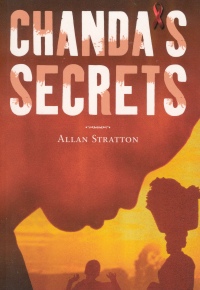| ________________
CM . . .
. Volume X Number 20 . . . . June 4, 2004
excerpt:
HIV/AIDS, the unspoken menace, influences life not only in Bonang, Stratton's fictional Sub-Saharan shantytown, but throughout the African continent. To prepare for writing Chanda's Secrets, actor, playwright, and author Stratton visited homes, government and non-government agencies and educational institutions, as well as hospitals and mortuaries in cities, villages, and cattle posts throughout Zimbabwe, Botswana, Kenya and South Africa. So moved was he with his experiences that the Toronto-based writer has donated the "proceeds from the sale of this book" to "be used to support organizations working to better the lives of Africans living with HIV/AIDS." Chanda Kabelo's first person account of her incredibly difficult sixteenth year begins with the death of baby Sara, her half-sister. Chanda, shouldering responsibility for her mother and two surviving younger siblings, arranges and manages the funeral and accompanying burial feast according to local customs. Twice widowed, her mother, depressed and heartbroken, "thinks by pretending everything's fine she can fool us into happiness," but suffers immobilizing headaches exacerbated by the drunkenness of her partner and Sara's father, Jonah. As Mama takes to her bed, nursing her secrets, Chanda assumes all of the household duties including the care of her younger brother and sister, both misbehaving in response to the tense atmosphere. Only Esther, who had befriended Chanda ten years earlier when the Kabelo family moved from a northern Tiro cattle post, offers Chanda some relief. Esther, however, has her own secrets as she earns money "posing for photos" to gain custody of her siblings distributed among relatives after their parents died of the unmentionable, HIV/AIDS. When Esther turns up "battered, swollen and half-naked" with her face slashed, Chanda takes her in despite her newfound knowledge of Esther's prostitution and the strong disapproval of a busybody neighbour, Mrs. Tafa. Mama visits a quack pushing Herbatex products and allows the local spirit doctor a house call, but when her condition continues to deteriorate, she leaves her children and returns to her home village, Tiro, to dispel the evil demons. After failing to hear from Mama, Chanda knows something is terribly wrong and journeys to Tiro only to find that the family has secreted Mama in an abandoned building where she lies dying. "If Mama's going to die," Chanda insists, "she's going to die at home, surrounded by family who love her. I'm tired of lies and hiding and being afraid. I'm not ashamed of AIDS, I'm ashamed of being ashamed." Surprisingly Mrs. Tafa, the Keeper of Scandals, dispels the potential of being "cut off, shunned, and left to die alone" by welcoming Mama home and clandestinely confessing to Chanda that her late much lionized son had actually committed suicide when a routine medical tested him HIV positive. Although Chanda dreams of winning a scholarship to "become a doctor, a lawyer, a teacher," she shelves her hopes and gladly accepts help from her teacher, Mr. Selalame, who recommends her as an elementary supply teacher replacing the many sick teachers. Chanda successfully organizes and supports her small family and welcomes Esther and her siblings to their home. Finally she conquers her own secret fears and arranges HIV/AIDS testing for them all; only Esther's test is positive. The narrative closes on an encouraging note with Chanda's new dream of starting a Lilian Kabelo Friendship Project to help all her suffering friends and neighbours cope with the HIV/AIDS pandemic. Stratton, as with Leslie's Journal (2000), effectively captures the teenage voice revealing the hopes, dreams, fears, and courage of a fully realized character who faces extraordinary difficulties and challenges with dignity and resolution. By focusing on Chanda's personal struggle with what Stephen Lewis, UN special envoy for HIV/AIDS in Africa, calls a "sinister, invisible poison," the novel demonstrates that love, loyalty, family, and friendship can flourish in an open and truthful atmosphere once the destructive influence of secrecy has been conquered. With well-paced, robust prose and well-cadenced dialogue, the novel provides valuable insights into the role religion, superstition, culture and customs play in the daily lives of Bonangians. Chanda's struggles put a face to the devastating effects of HIV/AIDS and provide a gripping and heart-wrenching reading experience designed for mature readers. Younger readers may need some preparation to deal with the sensitive and complex topics the novel addresses. Rape, prostitution, adultery, sexual abuse, HIV/AIDS and other difficult subjects are presented in a matter-of-fact fashion and lend credibility and honesty to this discussion of a modern epidemic. According to information in "About the Author," The Coady International Institute "was invaluable in developing the teacher's guide for this book" that will be available at www.annickpress.com - click on "For Teachers." Highly Recommended. Darleen Golke is a librarian "between assignments" living in Abbotsford, BC.
To comment
on this title or this review, send mail to cm@umanitoba.ca.
Copyright © the Manitoba Library Association. Reproduction for personal
use is permitted only if this copyright notice is maintained. Any
other reproduction is prohibited without permission.
NEXT REVIEW |
TABLE OF CONTENTS FOR THIS ISSUE
- June 4, 2004.
AUTHORS |
TITLES |
MEDIA REVIEWS |
PROFILES |
BACK ISSUES |
SEARCH |
CMARCHIVE |
HOME |
